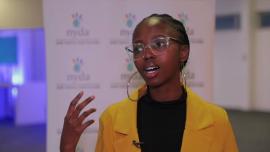
Minister for Women, Youth and People with Disabilities, Dr Nkosazana Dlamini Zuma, has called on young people to lead the charge against all forms of exploitation.
“You need to imagine a society where everyone has basic socio-economic security. You also have the intellectual responsibility to break society from their seeming acceptance of rentier capitalism as an accepted orthodoxy,” Dlamini Zuma said on Tuesday.
The Minister was addressing the BRICS (Brazil, Russia, India, China, and South Africa) Youth Summit in Durban, which was attended by BRICS Youth leaders in Durban.
She encouraged young people to establish an alternative public banking and finance system that will fund development initiatives.
“I expect your summit to reimagine an Alternative Banking and Financing Architecture for the global south. Productive societies require productive sectors of the economy, industrialised around manufactured finished goods and away from the shipping of raw materials.
“We currently have a structural problem of a banking industry that is not only greatly concentrated and monopolised, but also in many ways does not serve our interests. Those who prefer us shipping raw materials will not fund our manufacturing plants. They will not fund a rail system that connects the content for the movement of people, goods and services.
“The New Development Bank is thus a step in the right direction but we need to domesticate alternative banking as a matter of urgency,” the Minister said.
She warned that without control over finance and banking, only those projects that converge with the interest of private interests will be funded while the interests of the communities takes a backseat.
“As BRICS Youth Leaders, you are responsible for writing a new developmental script, which must include a blueprint for integration and interconnection of people and systems across the BRICS nations and its partners.
“Integration should mean integrated Finance, Information and communication technologies (ICT) for communication, trading, and accessibility of public health services by bridging the distance between national systems.
“Our integrated ICT strategies should connect our youth digitally, enable cultural exchanges and leverage the power and ability of the creative industry to generate millions of jobs across BRICS,” the Minister said.
She described the space that young people were in as the verge of a geopolitical revolution, which will jolt the global community from its slumber.
“What we make of BRICS and what becomes of this alliance has the potential to change the course of history and accelerate the downfall of an unjust imperialist world order. BRICS is a breakaway from the past.
“You have the responsibility to make the concept of BRICS relatable to people from all walks of life, particularly those who remain at the margins of society. The BRICS concept must not be an elite one,” the Minister said.
She said BRICS and its multipolar outlook is fundamentally about repairing an unjust past and preparing for a future of collective well-being and prosperity among equals.
“Multipolarity is a departure from the dominant reality of a unipolar world order, in which there is only one dominant power. The rationale behind multipolarity is that it promotes stability and reduces the likelihood of conflicts.
“Our passion for BRICS must run alongside our drive for the integration of both Africa and Africans, those at home, and in the diaspora. Through African integration, we should seek to take back the slavery, colonialism, and neo-colonialism that took away from us,” the Minister said.
Dlamini Zuma said the leaders have the responsibility to end the manufacturing of consent through media monopolies, which are currently engaged in mainstream misinformation and disinformation campaigns.
“I expect you to take this matter very seriously. Ongoing misinformation about and against BRICS itself should motivate you all to imagine new and alternative media platforms and narratives that do not reduce us into subjects or even objects. We need alternative forms of conscious journalism out of this summit,” the Minister said.
National Youth Development Agency (NYDA) Executive Chairperson, Asanda Luwaca, said South Africa's membership in BRICS amplifies the country’s voice on important global issues.
“We can address challenges such as poverty, unemployment and inequality coupled with sustainable development, climate change, and social inequality more effectively when working with those who share a common vision.
“Through collaboration, we can share best practices, exchange knowledge, and create innovative solutions that benefit not only amongst the youth of South Africa but also those across the BRICS community,” Luwaca said.
She said BRICS could serve as a launch pad for entrepreneurship and innovation amongst young people.
“By creating platforms for collaboration and knowledge sharing, we can foster an environment that nurtures creativity, supports start-ups, and promotes technological advancements. Access to funding, mentorship programs, and incubation centres within the BRICS framework can provide young entrepreneurs with the necessary resources and networks to turn their ideas into successful ventures,” Luwaca said. – SAnews.gov.za


